Leadership and Management Strategies in the TESCO Organization
VerifiedAdded on 2021/02/20
|10
|2827
|50
Report
AI Summary
This report provides a comprehensive analysis of leadership and management practices within TESCO, a multinational retail giant. It begins by differentiating between the roles and characteristics of leaders and managers, highlighting their distinct responsibilities and attributes. The report then examines various leadership approaches employed by TESCO, including situational, systems, and contingency leadership, and analyzes how these approaches are applied in different organizational situations, such as product pricing and conflict resolution. Furthermore, the report delves into the influence of external business environment factors, using PESTLE analysis to assess the impact of political, economic, social, technological, legal, and environmental factors on managerial and leadership decision-making processes within TESCO. The report concludes by synthesizing these elements to provide a holistic understanding of leadership and management in the context of a large-scale retail organization.
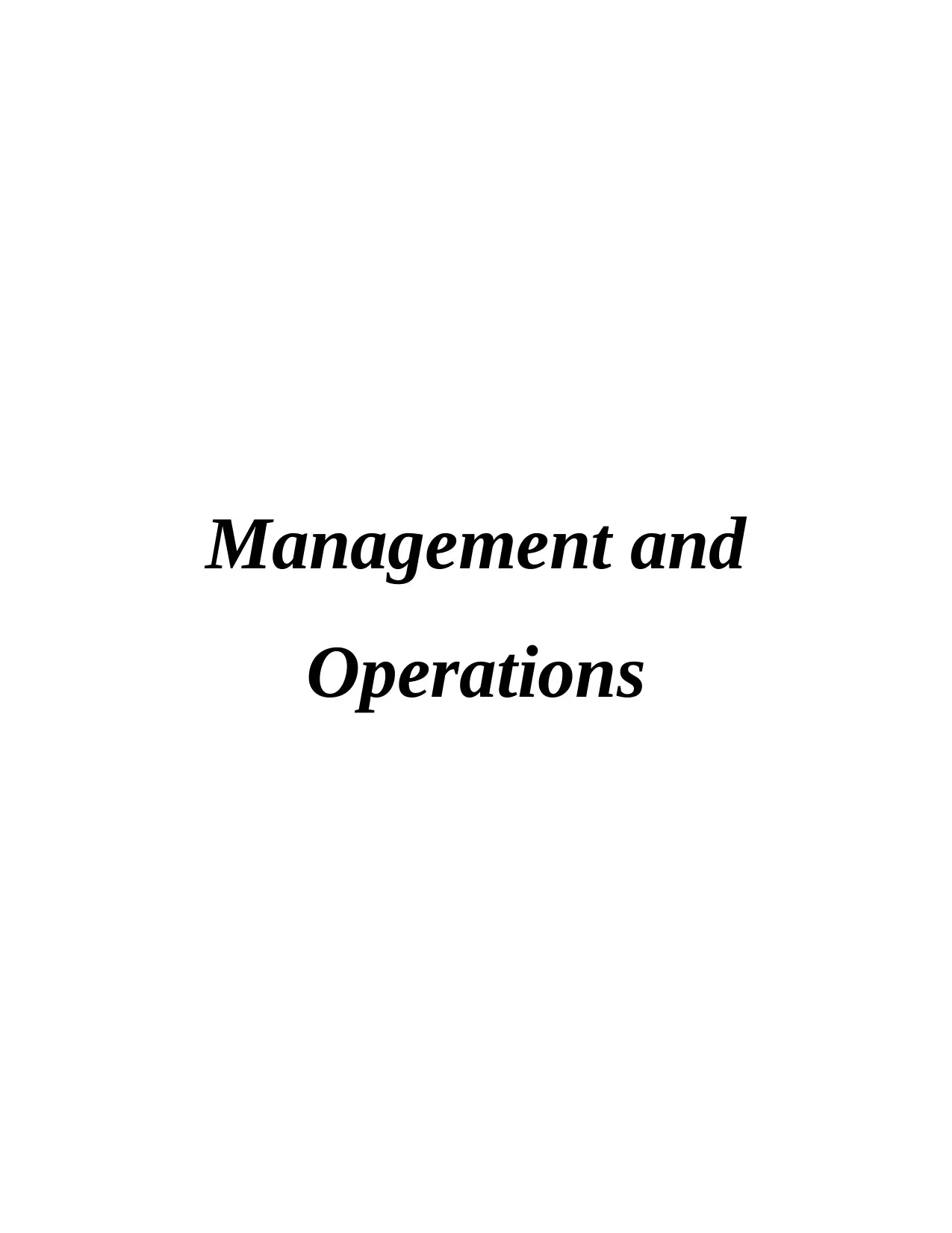
Management and
Operations
Operations
Paraphrase This Document
Need a fresh take? Get an instant paraphrase of this document with our AI Paraphraser
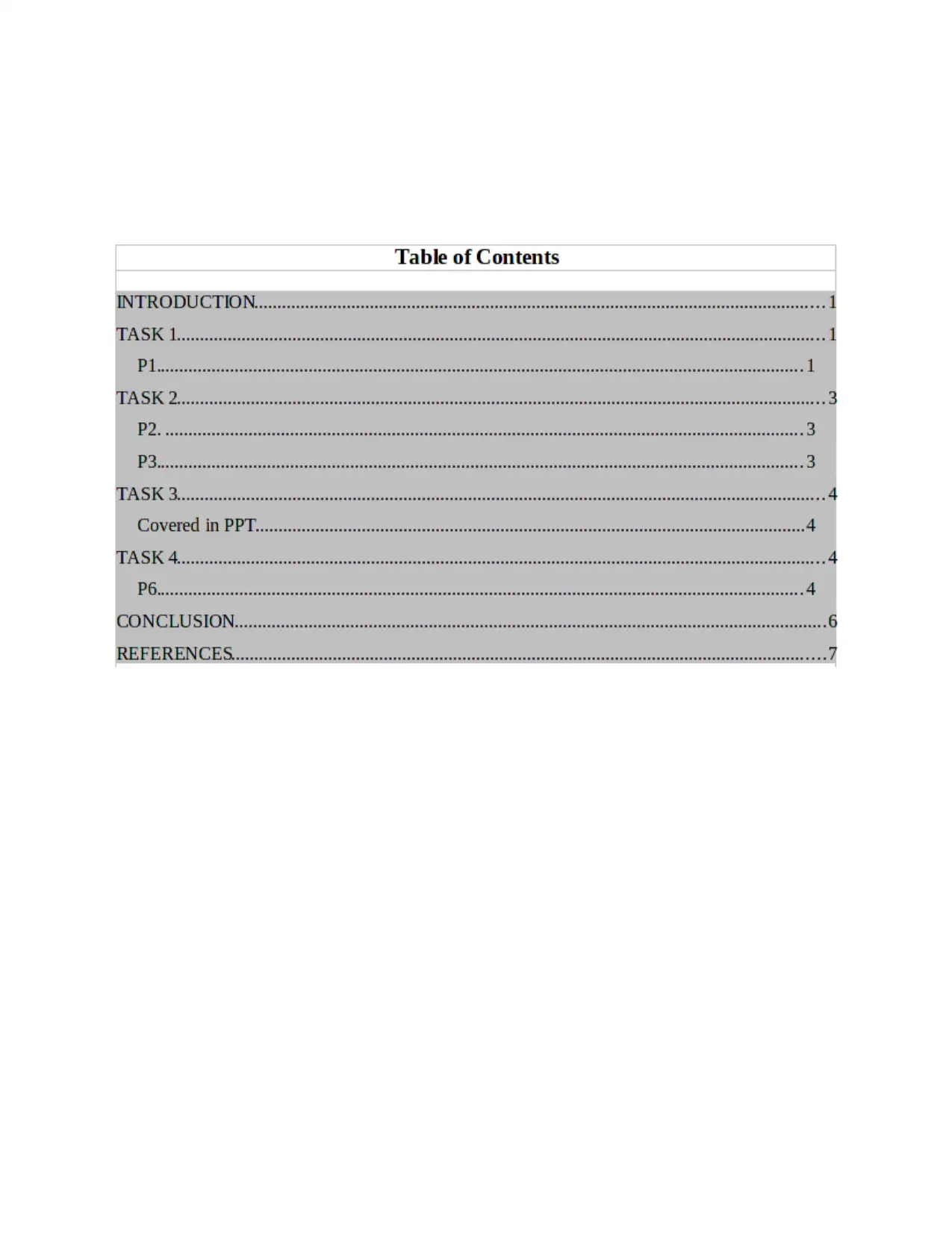
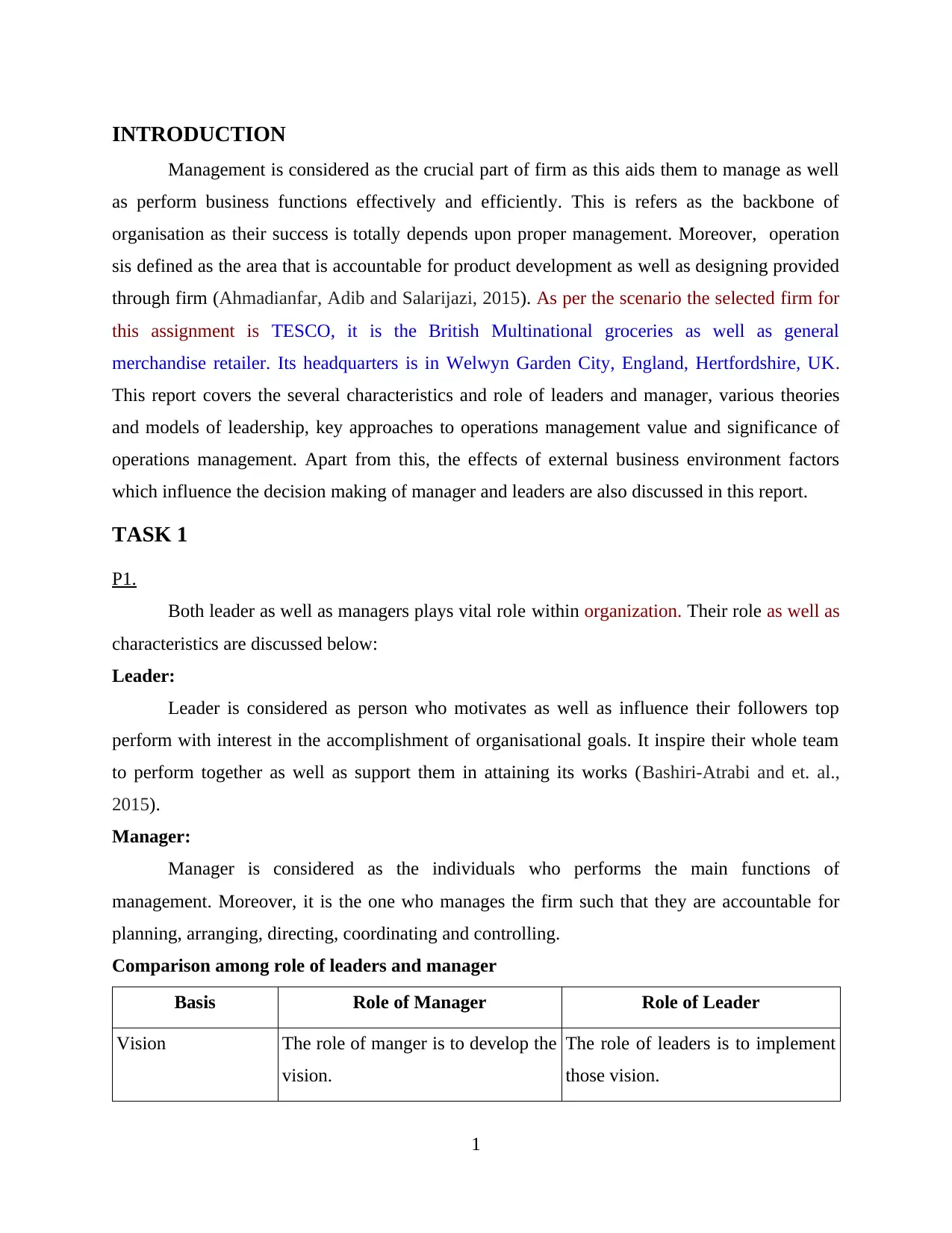
INTRODUCTION
Management is considered as the crucial part of firm as this aids them to manage as well
as perform business functions effectively and efficiently. This is refers as the backbone of
organisation as their success is totally depends upon proper management. Moreover, operation
sis defined as the area that is accountable for product development as well as designing provided
through firm (Ahmadianfar, Adib and Salarijazi, 2015). As per the scenario the selected firm for
this assignment is TESCO, it is the British Multinational groceries as well as general
merchandise retailer. Its headquarters is in Welwyn Garden City, England, Hertfordshire, UK.
This report covers the several characteristics and role of leaders and manager, various theories
and models of leadership, key approaches to operations management value and significance of
operations management. Apart from this, the effects of external business environment factors
which influence the decision making of manager and leaders are also discussed in this report.
TASK 1
P1.
Both leader as well as managers plays vital role within organization. Their role as well as
characteristics are discussed below:
Leader:
Leader is considered as person who motivates as well as influence their followers top
perform with interest in the accomplishment of organisational goals. It inspire their whole team
to perform together as well as support them in attaining its works (Bashiri-Atrabi and et. al.,
2015).
Manager:
Manager is considered as the individuals who performs the main functions of
management. Moreover, it is the one who manages the firm such that they are accountable for
planning, arranging, directing, coordinating and controlling.
Comparison among role of leaders and manager
Basis Role of Manager Role of Leader
Vision The role of manger is to develop the
vision.
The role of leaders is to implement
those vision.
1
Management is considered as the crucial part of firm as this aids them to manage as well
as perform business functions effectively and efficiently. This is refers as the backbone of
organisation as their success is totally depends upon proper management. Moreover, operation
sis defined as the area that is accountable for product development as well as designing provided
through firm (Ahmadianfar, Adib and Salarijazi, 2015). As per the scenario the selected firm for
this assignment is TESCO, it is the British Multinational groceries as well as general
merchandise retailer. Its headquarters is in Welwyn Garden City, England, Hertfordshire, UK.
This report covers the several characteristics and role of leaders and manager, various theories
and models of leadership, key approaches to operations management value and significance of
operations management. Apart from this, the effects of external business environment factors
which influence the decision making of manager and leaders are also discussed in this report.
TASK 1
P1.
Both leader as well as managers plays vital role within organization. Their role as well as
characteristics are discussed below:
Leader:
Leader is considered as person who motivates as well as influence their followers top
perform with interest in the accomplishment of organisational goals. It inspire their whole team
to perform together as well as support them in attaining its works (Bashiri-Atrabi and et. al.,
2015).
Manager:
Manager is considered as the individuals who performs the main functions of
management. Moreover, it is the one who manages the firm such that they are accountable for
planning, arranging, directing, coordinating and controlling.
Comparison among role of leaders and manager
Basis Role of Manager Role of Leader
Vision The role of manger is to develop the
vision.
The role of leaders is to implement
those vision.
1
⊘ This is a preview!⊘
Do you want full access?
Subscribe today to unlock all pages.

Trusted by 1+ million students worldwide
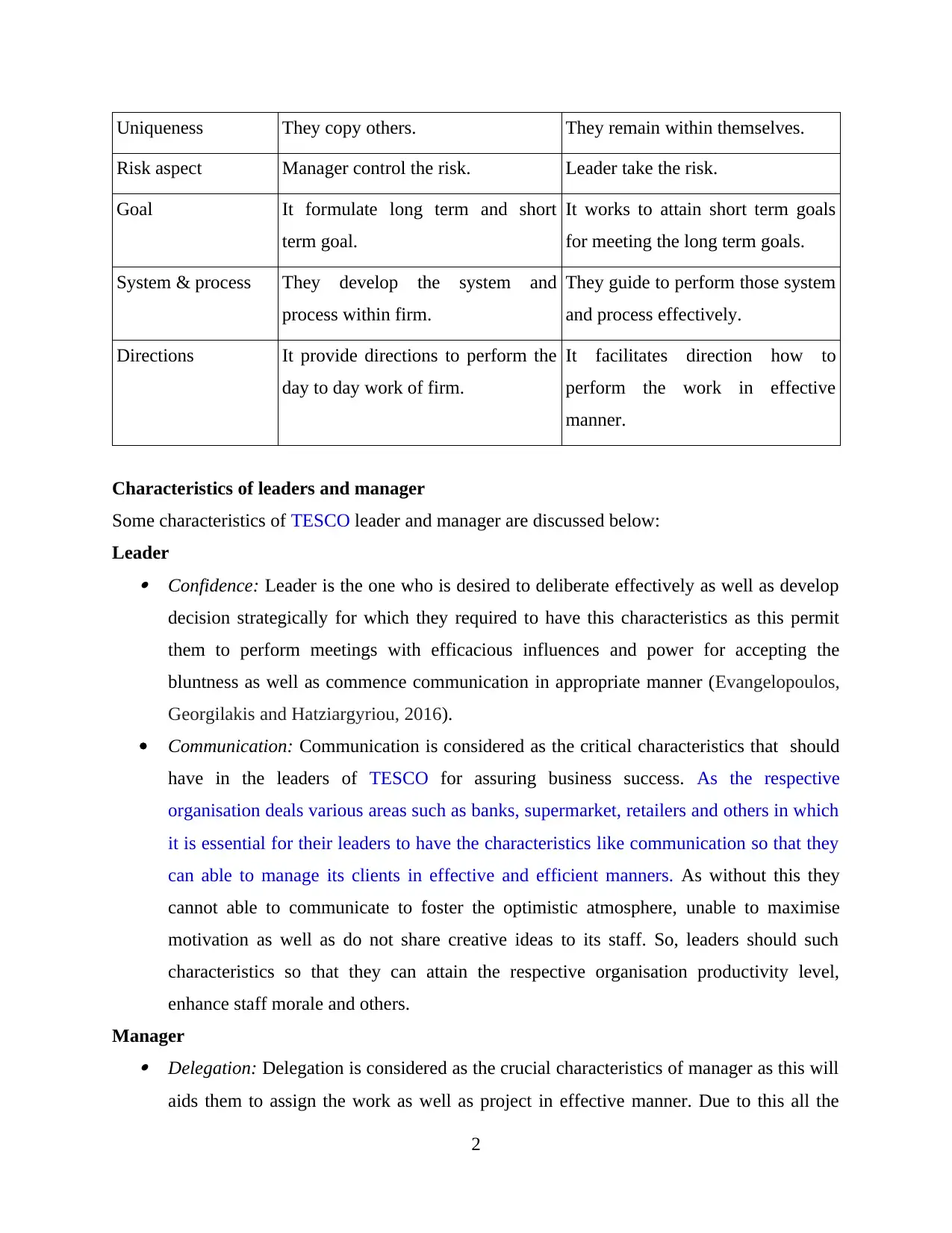
Uniqueness They copy others. They remain within themselves.
Risk aspect Manager control the risk. Leader take the risk.
Goal It formulate long term and short
term goal.
It works to attain short term goals
for meeting the long term goals.
System & process They develop the system and
process within firm.
They guide to perform those system
and process effectively.
Directions It provide directions to perform the
day to day work of firm.
It facilitates direction how to
perform the work in effective
manner.
Characteristics of leaders and manager
Some characteristics of TESCO leader and manager are discussed below:
Leader Confidence: Leader is the one who is desired to deliberate effectively as well as develop
decision strategically for which they required to have this characteristics as this permit
them to perform meetings with efficacious influences and power for accepting the
bluntness as well as commence communication in appropriate manner (Evangelopoulos,
Georgilakis and Hatziargyriou, 2016).
Communication: Communication is considered as the critical characteristics that should
have in the leaders of TESCO for assuring business success. As the respective
organisation deals various areas such as banks, supermarket, retailers and others in which
it is essential for their leaders to have the characteristics like communication so that they
can able to manage its clients in effective and efficient manners. As without this they
cannot able to communicate to foster the optimistic atmosphere, unable to maximise
motivation as well as do not share creative ideas to its staff. So, leaders should such
characteristics so that they can attain the respective organisation productivity level,
enhance staff morale and others.
Manager Delegation: Delegation is considered as the crucial characteristics of manager as this will
aids them to assign the work as well as project in effective manner. Due to this all the
2
Risk aspect Manager control the risk. Leader take the risk.
Goal It formulate long term and short
term goal.
It works to attain short term goals
for meeting the long term goals.
System & process They develop the system and
process within firm.
They guide to perform those system
and process effectively.
Directions It provide directions to perform the
day to day work of firm.
It facilitates direction how to
perform the work in effective
manner.
Characteristics of leaders and manager
Some characteristics of TESCO leader and manager are discussed below:
Leader Confidence: Leader is the one who is desired to deliberate effectively as well as develop
decision strategically for which they required to have this characteristics as this permit
them to perform meetings with efficacious influences and power for accepting the
bluntness as well as commence communication in appropriate manner (Evangelopoulos,
Georgilakis and Hatziargyriou, 2016).
Communication: Communication is considered as the critical characteristics that should
have in the leaders of TESCO for assuring business success. As the respective
organisation deals various areas such as banks, supermarket, retailers and others in which
it is essential for their leaders to have the characteristics like communication so that they
can able to manage its clients in effective and efficient manners. As without this they
cannot able to communicate to foster the optimistic atmosphere, unable to maximise
motivation as well as do not share creative ideas to its staff. So, leaders should such
characteristics so that they can attain the respective organisation productivity level,
enhance staff morale and others.
Manager Delegation: Delegation is considered as the crucial characteristics of manager as this will
aids them to assign the work as well as project in effective manner. Due to this all the
2
Paraphrase This Document
Need a fresh take? Get an instant paraphrase of this document with our AI Paraphraser
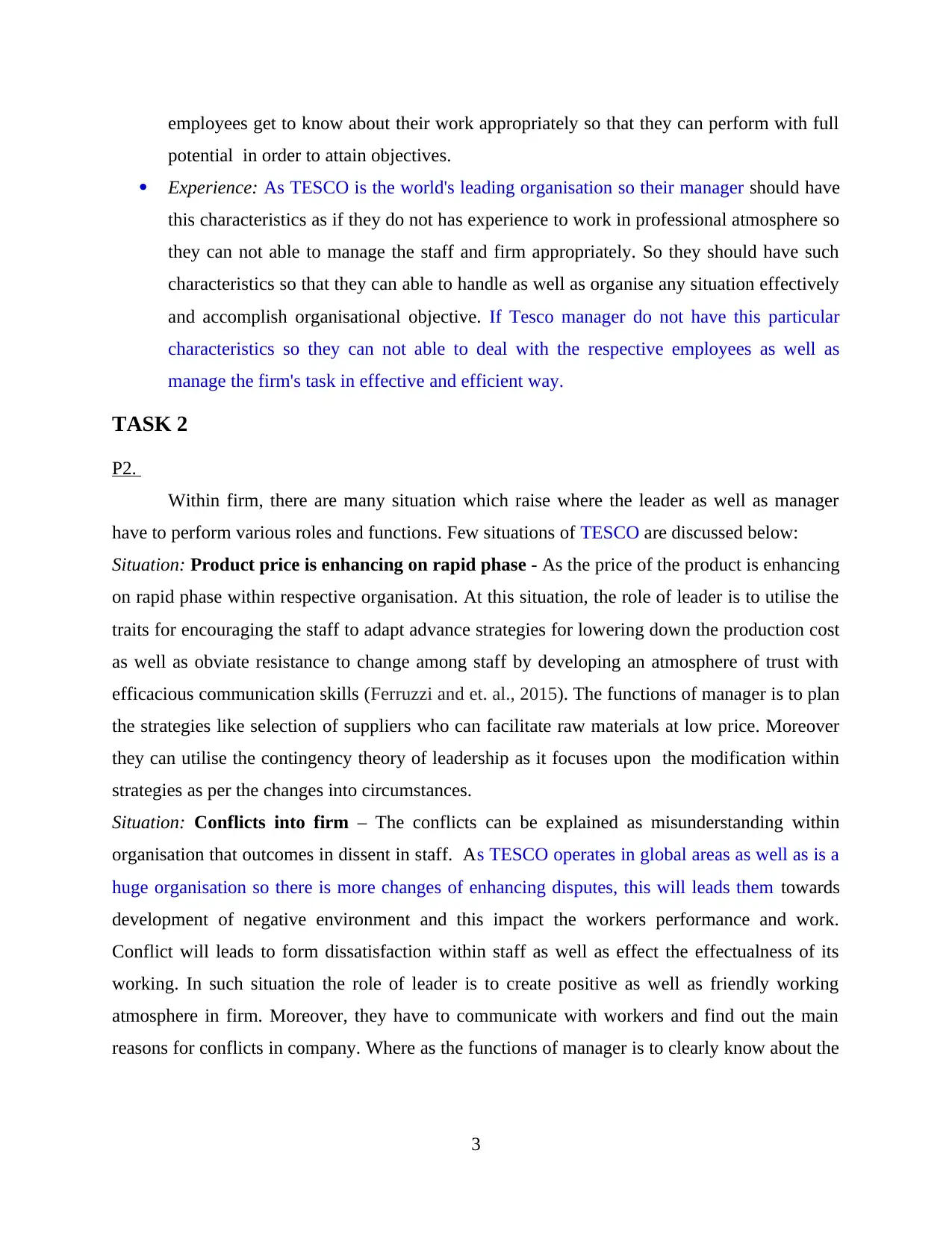
employees get to know about their work appropriately so that they can perform with full
potential in order to attain objectives.
Experience: As TESCO is the world's leading organisation so their manager should have
this characteristics as if they do not has experience to work in professional atmosphere so
they can not able to manage the staff and firm appropriately. So they should have such
characteristics so that they can able to handle as well as organise any situation effectively
and accomplish organisational objective. If Tesco manager do not have this particular
characteristics so they can not able to deal with the respective employees as well as
manage the firm's task in effective and efficient way.
TASK 2
P2.
Within firm, there are many situation which raise where the leader as well as manager
have to perform various roles and functions. Few situations of TESCO are discussed below:
Situation: Product price is enhancing on rapid phase - As the price of the product is enhancing
on rapid phase within respective organisation. At this situation, the role of leader is to utilise the
traits for encouraging the staff to adapt advance strategies for lowering down the production cost
as well as obviate resistance to change among staff by developing an atmosphere of trust with
efficacious communication skills (Ferruzzi and et. al., 2015). The functions of manager is to plan
the strategies like selection of suppliers who can facilitate raw materials at low price. Moreover
they can utilise the contingency theory of leadership as it focuses upon the modification within
strategies as per the changes into circumstances.
Situation: Conflicts into firm – The conflicts can be explained as misunderstanding within
organisation that outcomes in dissent in staff. As TESCO operates in global areas as well as is a
huge organisation so there is more changes of enhancing disputes, this will leads them towards
development of negative environment and this impact the workers performance and work.
Conflict will leads to form dissatisfaction within staff as well as effect the effectualness of its
working. In such situation the role of leader is to create positive as well as friendly working
atmosphere in firm. Moreover, they have to communicate with workers and find out the main
reasons for conflicts in company. Where as the functions of manager is to clearly know about the
3
potential in order to attain objectives.
Experience: As TESCO is the world's leading organisation so their manager should have
this characteristics as if they do not has experience to work in professional atmosphere so
they can not able to manage the staff and firm appropriately. So they should have such
characteristics so that they can able to handle as well as organise any situation effectively
and accomplish organisational objective. If Tesco manager do not have this particular
characteristics so they can not able to deal with the respective employees as well as
manage the firm's task in effective and efficient way.
TASK 2
P2.
Within firm, there are many situation which raise where the leader as well as manager
have to perform various roles and functions. Few situations of TESCO are discussed below:
Situation: Product price is enhancing on rapid phase - As the price of the product is enhancing
on rapid phase within respective organisation. At this situation, the role of leader is to utilise the
traits for encouraging the staff to adapt advance strategies for lowering down the production cost
as well as obviate resistance to change among staff by developing an atmosphere of trust with
efficacious communication skills (Ferruzzi and et. al., 2015). The functions of manager is to plan
the strategies like selection of suppliers who can facilitate raw materials at low price. Moreover
they can utilise the contingency theory of leadership as it focuses upon the modification within
strategies as per the changes into circumstances.
Situation: Conflicts into firm – The conflicts can be explained as misunderstanding within
organisation that outcomes in dissent in staff. As TESCO operates in global areas as well as is a
huge organisation so there is more changes of enhancing disputes, this will leads them towards
development of negative environment and this impact the workers performance and work.
Conflict will leads to form dissatisfaction within staff as well as effect the effectualness of its
working. In such situation the role of leader is to create positive as well as friendly working
atmosphere in firm. Moreover, they have to communicate with workers and find out the main
reasons for conflicts in company. Where as the functions of manager is to clearly know about the
3
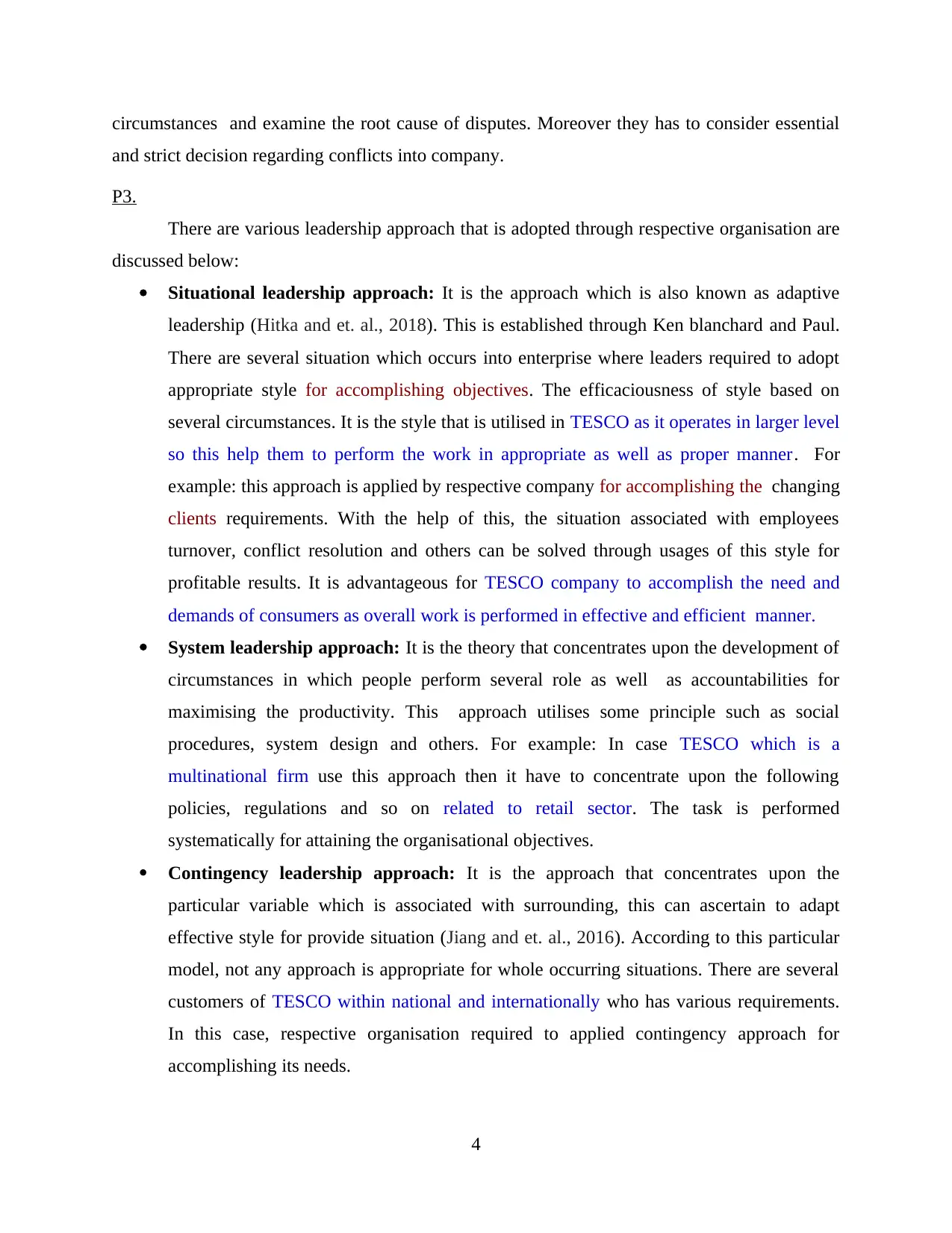
circumstances and examine the root cause of disputes. Moreover they has to consider essential
and strict decision regarding conflicts into company.
P3.
There are various leadership approach that is adopted through respective organisation are
discussed below:
Situational leadership approach: It is the approach which is also known as adaptive
leadership (Hitka and et. al., 2018). This is established through Ken blanchard and Paul.
There are several situation which occurs into enterprise where leaders required to adopt
appropriate style for accomplishing objectives. The efficaciousness of style based on
several circumstances. It is the style that is utilised in TESCO as it operates in larger level
so this help them to perform the work in appropriate as well as proper manner. For
example: this approach is applied by respective company for accomplishing the changing
clients requirements. With the help of this, the situation associated with employees
turnover, conflict resolution and others can be solved through usages of this style for
profitable results. It is advantageous for TESCO company to accomplish the need and
demands of consumers as overall work is performed in effective and efficient manner.
System leadership approach: It is the theory that concentrates upon the development of
circumstances in which people perform several role as well as accountabilities for
maximising the productivity. This approach utilises some principle such as social
procedures, system design and others. For example: In case TESCO which is a
multinational firm use this approach then it have to concentrate upon the following
policies, regulations and so on related to retail sector. The task is performed
systematically for attaining the organisational objectives.
Contingency leadership approach: It is the approach that concentrates upon the
particular variable which is associated with surrounding, this can ascertain to adapt
effective style for provide situation (Jiang and et. al., 2016). According to this particular
model, not any approach is appropriate for whole occurring situations. There are several
customers of TESCO within national and internationally who has various requirements.
In this case, respective organisation required to applied contingency approach for
accomplishing its needs.
4
and strict decision regarding conflicts into company.
P3.
There are various leadership approach that is adopted through respective organisation are
discussed below:
Situational leadership approach: It is the approach which is also known as adaptive
leadership (Hitka and et. al., 2018). This is established through Ken blanchard and Paul.
There are several situation which occurs into enterprise where leaders required to adopt
appropriate style for accomplishing objectives. The efficaciousness of style based on
several circumstances. It is the style that is utilised in TESCO as it operates in larger level
so this help them to perform the work in appropriate as well as proper manner. For
example: this approach is applied by respective company for accomplishing the changing
clients requirements. With the help of this, the situation associated with employees
turnover, conflict resolution and others can be solved through usages of this style for
profitable results. It is advantageous for TESCO company to accomplish the need and
demands of consumers as overall work is performed in effective and efficient manner.
System leadership approach: It is the theory that concentrates upon the development of
circumstances in which people perform several role as well as accountabilities for
maximising the productivity. This approach utilises some principle such as social
procedures, system design and others. For example: In case TESCO which is a
multinational firm use this approach then it have to concentrate upon the following
policies, regulations and so on related to retail sector. The task is performed
systematically for attaining the organisational objectives.
Contingency leadership approach: It is the approach that concentrates upon the
particular variable which is associated with surrounding, this can ascertain to adapt
effective style for provide situation (Jiang and et. al., 2016). According to this particular
model, not any approach is appropriate for whole occurring situations. There are several
customers of TESCO within national and internationally who has various requirements.
In this case, respective organisation required to applied contingency approach for
accomplishing its needs.
4
⊘ This is a preview!⊘
Do you want full access?
Subscribe today to unlock all pages.

Trusted by 1+ million students worldwide
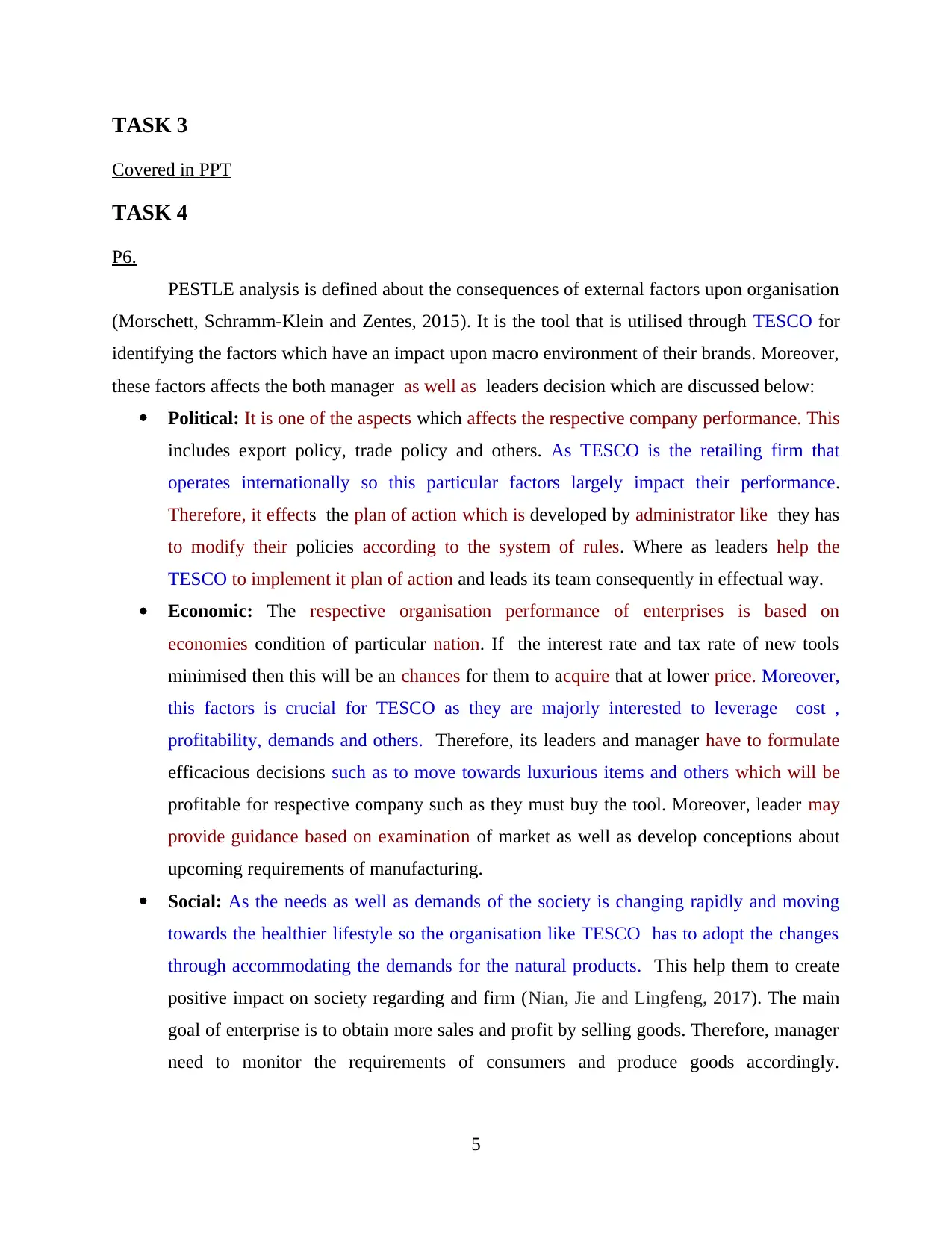
TASK 3
Covered in PPT
TASK 4
P6.
PESTLE analysis is defined about the consequences of external factors upon organisation
(Morschett, Schramm-Klein and Zentes, 2015). It is the tool that is utilised through TESCO for
identifying the factors which have an impact upon macro environment of their brands. Moreover,
these factors affects the both manager as well as leaders decision which are discussed below:
Political: It is one of the aspects which affects the respective company performance. This
includes export policy, trade policy and others. As TESCO is the retailing firm that
operates internationally so this particular factors largely impact their performance.
Therefore, it effects the plan of action which is developed by administrator like they has
to modify their policies according to the system of rules. Where as leaders help the
TESCO to implement it plan of action and leads its team consequently in effectual way.
Economic: The respective organisation performance of enterprises is based on
economies condition of particular nation. If the interest rate and tax rate of new tools
minimised then this will be an chances for them to acquire that at lower price. Moreover,
this factors is crucial for TESCO as they are majorly interested to leverage cost ,
profitability, demands and others. Therefore, its leaders and manager have to formulate
efficacious decisions such as to move towards luxurious items and others which will be
profitable for respective company such as they must buy the tool. Moreover, leader may
provide guidance based on examination of market as well as develop conceptions about
upcoming requirements of manufacturing.
Social: As the needs as well as demands of the society is changing rapidly and moving
towards the healthier lifestyle so the organisation like TESCO has to adopt the changes
through accommodating the demands for the natural products. This help them to create
positive impact on society regarding and firm (Nian, Jie and Lingfeng, 2017). The main
goal of enterprise is to obtain more sales and profit by selling goods. Therefore, manager
need to monitor the requirements of consumers and produce goods accordingly.
5
Covered in PPT
TASK 4
P6.
PESTLE analysis is defined about the consequences of external factors upon organisation
(Morschett, Schramm-Klein and Zentes, 2015). It is the tool that is utilised through TESCO for
identifying the factors which have an impact upon macro environment of their brands. Moreover,
these factors affects the both manager as well as leaders decision which are discussed below:
Political: It is one of the aspects which affects the respective company performance. This
includes export policy, trade policy and others. As TESCO is the retailing firm that
operates internationally so this particular factors largely impact their performance.
Therefore, it effects the plan of action which is developed by administrator like they has
to modify their policies according to the system of rules. Where as leaders help the
TESCO to implement it plan of action and leads its team consequently in effectual way.
Economic: The respective organisation performance of enterprises is based on
economies condition of particular nation. If the interest rate and tax rate of new tools
minimised then this will be an chances for them to acquire that at lower price. Moreover,
this factors is crucial for TESCO as they are majorly interested to leverage cost ,
profitability, demands and others. Therefore, its leaders and manager have to formulate
efficacious decisions such as to move towards luxurious items and others which will be
profitable for respective company such as they must buy the tool. Moreover, leader may
provide guidance based on examination of market as well as develop conceptions about
upcoming requirements of manufacturing.
Social: As the needs as well as demands of the society is changing rapidly and moving
towards the healthier lifestyle so the organisation like TESCO has to adopt the changes
through accommodating the demands for the natural products. This help them to create
positive impact on society regarding and firm (Nian, Jie and Lingfeng, 2017). The main
goal of enterprise is to obtain more sales and profit by selling goods. Therefore, manager
need to monitor the requirements of consumers and produce goods accordingly.
5
Paraphrase This Document
Need a fresh take? Get an instant paraphrase of this document with our AI Paraphraser
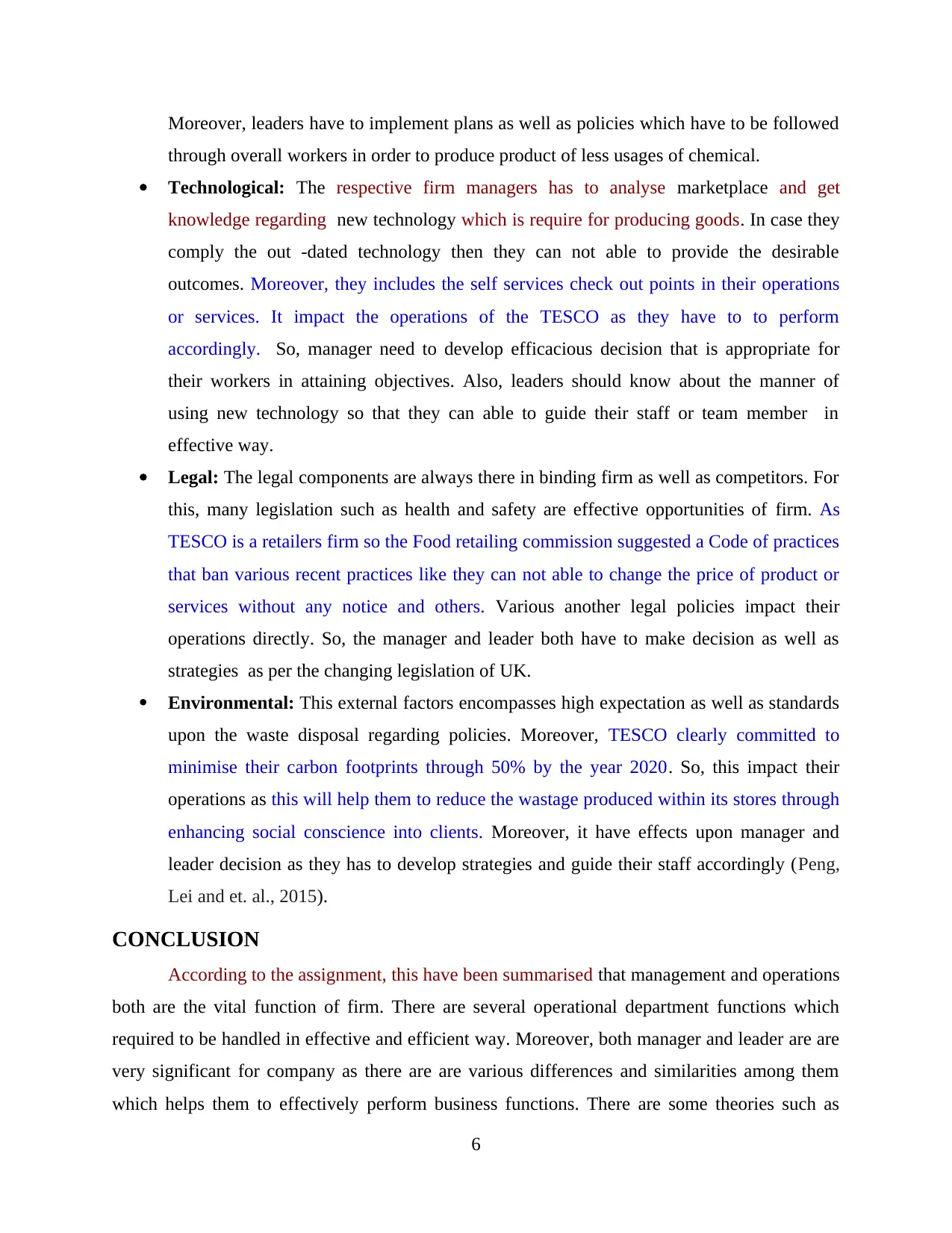
Moreover, leaders have to implement plans as well as policies which have to be followed
through overall workers in order to produce product of less usages of chemical.
Technological: The respective firm managers has to analyse marketplace and get
knowledge regarding new technology which is require for producing goods. In case they
comply the out -dated technology then they can not able to provide the desirable
outcomes. Moreover, they includes the self services check out points in their operations
or services. It impact the operations of the TESCO as they have to to perform
accordingly. So, manager need to develop efficacious decision that is appropriate for
their workers in attaining objectives. Also, leaders should know about the manner of
using new technology so that they can able to guide their staff or team member in
effective way.
Legal: The legal components are always there in binding firm as well as competitors. For
this, many legislation such as health and safety are effective opportunities of firm. As
TESCO is a retailers firm so the Food retailing commission suggested a Code of practices
that ban various recent practices like they can not able to change the price of product or
services without any notice and others. Various another legal policies impact their
operations directly. So, the manager and leader both have to make decision as well as
strategies as per the changing legislation of UK.
Environmental: This external factors encompasses high expectation as well as standards
upon the waste disposal regarding policies. Moreover, TESCO clearly committed to
minimise their carbon footprints through 50% by the year 2020. So, this impact their
operations as this will help them to reduce the wastage produced within its stores through
enhancing social conscience into clients. Moreover, it have effects upon manager and
leader decision as they has to develop strategies and guide their staff accordingly (Peng,
Lei and et. al., 2015).
CONCLUSION
According to the assignment, this have been summarised that management and operations
both are the vital function of firm. There are several operational department functions which
required to be handled in effective and efficient way. Moreover, both manager and leader are are
very significant for company as there are are various differences and similarities among them
which helps them to effectively perform business functions. There are some theories such as
6
through overall workers in order to produce product of less usages of chemical.
Technological: The respective firm managers has to analyse marketplace and get
knowledge regarding new technology which is require for producing goods. In case they
comply the out -dated technology then they can not able to provide the desirable
outcomes. Moreover, they includes the self services check out points in their operations
or services. It impact the operations of the TESCO as they have to to perform
accordingly. So, manager need to develop efficacious decision that is appropriate for
their workers in attaining objectives. Also, leaders should know about the manner of
using new technology so that they can able to guide their staff or team member in
effective way.
Legal: The legal components are always there in binding firm as well as competitors. For
this, many legislation such as health and safety are effective opportunities of firm. As
TESCO is a retailers firm so the Food retailing commission suggested a Code of practices
that ban various recent practices like they can not able to change the price of product or
services without any notice and others. Various another legal policies impact their
operations directly. So, the manager and leader both have to make decision as well as
strategies as per the changing legislation of UK.
Environmental: This external factors encompasses high expectation as well as standards
upon the waste disposal regarding policies. Moreover, TESCO clearly committed to
minimise their carbon footprints through 50% by the year 2020. So, this impact their
operations as this will help them to reduce the wastage produced within its stores through
enhancing social conscience into clients. Moreover, it have effects upon manager and
leader decision as they has to develop strategies and guide their staff accordingly (Peng,
Lei and et. al., 2015).
CONCLUSION
According to the assignment, this have been summarised that management and operations
both are the vital function of firm. There are several operational department functions which
required to be handled in effective and efficient way. Moreover, both manager and leader are are
very significant for company as there are are various differences and similarities among them
which helps them to effectively perform business functions. There are some theories such as
6
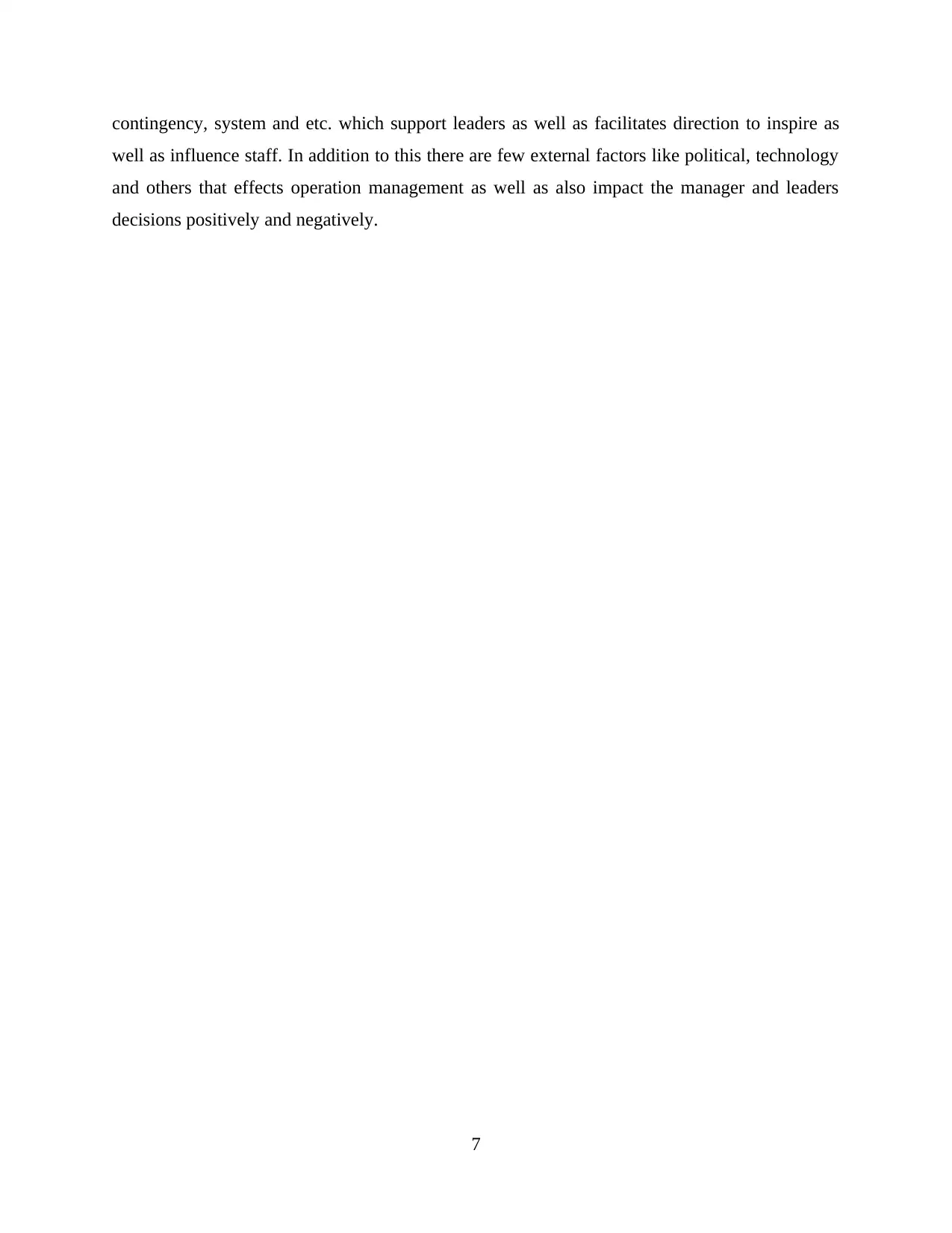
contingency, system and etc. which support leaders as well as facilitates direction to inspire as
well as influence staff. In addition to this there are few external factors like political, technology
and others that effects operation management as well as also impact the manager and leaders
decisions positively and negatively.
7
well as influence staff. In addition to this there are few external factors like political, technology
and others that effects operation management as well as also impact the manager and leaders
decisions positively and negatively.
7
⊘ This is a preview!⊘
Do you want full access?
Subscribe today to unlock all pages.

Trusted by 1+ million students worldwide
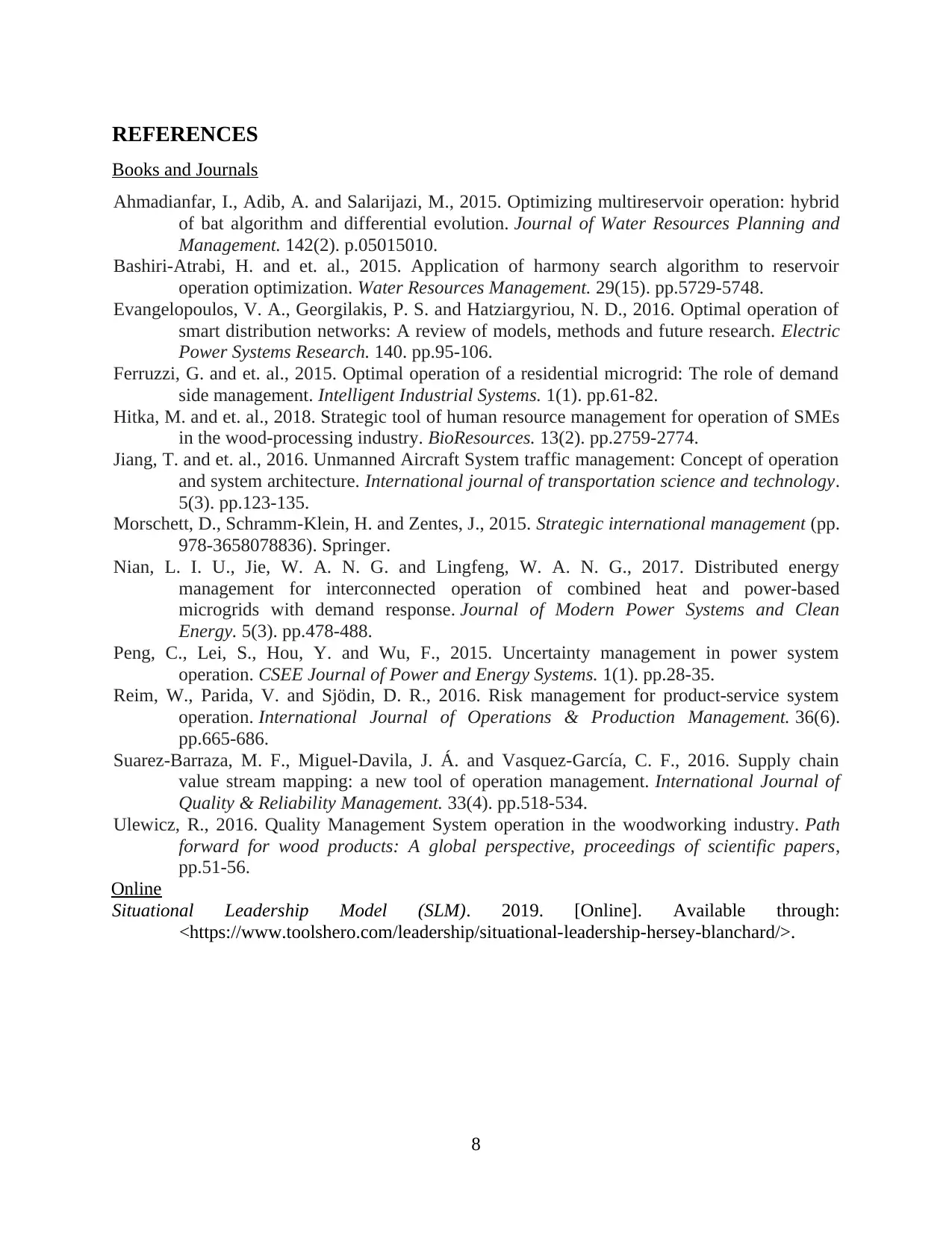
REFERENCES
Books and Journals
Ahmadianfar, I., Adib, A. and Salarijazi, M., 2015. Optimizing multireservoir operation: hybrid
of bat algorithm and differential evolution. Journal of Water Resources Planning and
Management. 142(2). p.05015010.
Bashiri-Atrabi, H. and et. al., 2015. Application of harmony search algorithm to reservoir
operation optimization. Water Resources Management. 29(15). pp.5729-5748.
Evangelopoulos, V. A., Georgilakis, P. S. and Hatziargyriou, N. D., 2016. Optimal operation of
smart distribution networks: A review of models, methods and future research. Electric
Power Systems Research. 140. pp.95-106.
Ferruzzi, G. and et. al., 2015. Optimal operation of a residential microgrid: The role of demand
side management. Intelligent Industrial Systems. 1(1). pp.61-82.
Hitka, M. and et. al., 2018. Strategic tool of human resource management for operation of SMEs
in the wood-processing industry. BioResources. 13(2). pp.2759-2774.
Jiang, T. and et. al., 2016. Unmanned Aircraft System traffic management: Concept of operation
and system architecture. International journal of transportation science and technology.
5(3). pp.123-135.
Morschett, D., Schramm-Klein, H. and Zentes, J., 2015. Strategic international management (pp.
978-3658078836). Springer.
Nian, L. I. U., Jie, W. A. N. G. and Lingfeng, W. A. N. G., 2017. Distributed energy
management for interconnected operation of combined heat and power-based
microgrids with demand response. Journal of Modern Power Systems and Clean
Energy. 5(3). pp.478-488.
Peng, C., Lei, S., Hou, Y. and Wu, F., 2015. Uncertainty management in power system
operation. CSEE Journal of Power and Energy Systems. 1(1). pp.28-35.
Reim, W., Parida, V. and Sjödin, D. R., 2016. Risk management for product-service system
operation. International Journal of Operations & Production Management. 36(6).
pp.665-686.
Suarez-Barraza, M. F., Miguel-Davila, J. Á. and Vasquez-García, C. F., 2016. Supply chain
value stream mapping: a new tool of operation management. International Journal of
Quality & Reliability Management. 33(4). pp.518-534.
Ulewicz, R., 2016. Quality Management System operation in the woodworking industry. Path
forward for wood products: A global perspective, proceedings of scientific papers,
pp.51-56.
Online
Situational Leadership Model (SLM). 2019. [Online]. Available through:
<https://www.toolshero.com/leadership/situational-leadership-hersey-blanchard/>.
8
Books and Journals
Ahmadianfar, I., Adib, A. and Salarijazi, M., 2015. Optimizing multireservoir operation: hybrid
of bat algorithm and differential evolution. Journal of Water Resources Planning and
Management. 142(2). p.05015010.
Bashiri-Atrabi, H. and et. al., 2015. Application of harmony search algorithm to reservoir
operation optimization. Water Resources Management. 29(15). pp.5729-5748.
Evangelopoulos, V. A., Georgilakis, P. S. and Hatziargyriou, N. D., 2016. Optimal operation of
smart distribution networks: A review of models, methods and future research. Electric
Power Systems Research. 140. pp.95-106.
Ferruzzi, G. and et. al., 2015. Optimal operation of a residential microgrid: The role of demand
side management. Intelligent Industrial Systems. 1(1). pp.61-82.
Hitka, M. and et. al., 2018. Strategic tool of human resource management for operation of SMEs
in the wood-processing industry. BioResources. 13(2). pp.2759-2774.
Jiang, T. and et. al., 2016. Unmanned Aircraft System traffic management: Concept of operation
and system architecture. International journal of transportation science and technology.
5(3). pp.123-135.
Morschett, D., Schramm-Klein, H. and Zentes, J., 2015. Strategic international management (pp.
978-3658078836). Springer.
Nian, L. I. U., Jie, W. A. N. G. and Lingfeng, W. A. N. G., 2017. Distributed energy
management for interconnected operation of combined heat and power-based
microgrids with demand response. Journal of Modern Power Systems and Clean
Energy. 5(3). pp.478-488.
Peng, C., Lei, S., Hou, Y. and Wu, F., 2015. Uncertainty management in power system
operation. CSEE Journal of Power and Energy Systems. 1(1). pp.28-35.
Reim, W., Parida, V. and Sjödin, D. R., 2016. Risk management for product-service system
operation. International Journal of Operations & Production Management. 36(6).
pp.665-686.
Suarez-Barraza, M. F., Miguel-Davila, J. Á. and Vasquez-García, C. F., 2016. Supply chain
value stream mapping: a new tool of operation management. International Journal of
Quality & Reliability Management. 33(4). pp.518-534.
Ulewicz, R., 2016. Quality Management System operation in the woodworking industry. Path
forward for wood products: A global perspective, proceedings of scientific papers,
pp.51-56.
Online
Situational Leadership Model (SLM). 2019. [Online]. Available through:
<https://www.toolshero.com/leadership/situational-leadership-hersey-blanchard/>.
8
1 out of 10
Related Documents
Your All-in-One AI-Powered Toolkit for Academic Success.
+13062052269
info@desklib.com
Available 24*7 on WhatsApp / Email
![[object Object]](/_next/static/media/star-bottom.7253800d.svg)
Unlock your academic potential
Copyright © 2020–2026 A2Z Services. All Rights Reserved. Developed and managed by ZUCOL.





